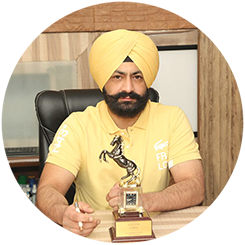Every surgeon is different. His education, techniques, training, results are different. Dr. Harprit did his first replacement in Aug. 1997 in 2.5 hours. Over the years the time involved decreased and now its done in 10-12 min on an average. Short surgery has its own benefits as there is no blood loss, exposure of tissues to air is less, hence less infection chances, lesser anesthesia time and lesser drugs and an early recovery.

He has successfully operated on a patient unable to walk because of knee arthritis and having a bad heart (of LVEF 25% working capacity). The patient placed her life in the hands of this young surgeon and consented to get knee replacement. The anaesthetist allowed only 15min of procedure. Dr. Harprit finished the job to perfection well within the time limit ie 9min 30sec the lady was smiling in his OPD chamber a year later to get the second side operated- which he gladly accepted.
Though speed is never a criteria in surgery but its always beneficial in a medically compromised patient for the surgical time to be as close to the starting time as possible.
In 10-12 minute, the anaesthetized body & heart doesn't even comprehend the trauma of surgery and by the time the heart recognizes the onslaught, the patient is stitched up and wheeled into the ICU thereby decreasing the risk. And also, the bleeding is minimal in 10 minutes as compared to a 1 hour surgery (which is a normal time of most surgeons). Similarly, in a cardiac compromised case, for a knee replacement Dr. Harprit takes somewhere near 10-12 minutes and for both sides knee replacement he takes somewhere 15-20 minutes only, for hip replacement he takes 15 minutes and for plating he takes somewhere near 4-5 minutes and for a partial hip replacement he takes a less as 4 minutes. He has also introduced the concept of painless knee replacement where in the patient does not require any painkillers after knee replacement.(post-op knee pain is managed by nerve blocks)
As the hospital deals in poly trauma and multifracture accident cases, a lady with both hips, both thigh and both legs fractured, in all 21 fractures in the body was treated with nailing and fixation and was on her heels in 15 days.

Dr. Harprit believes that approximately 1/3rd of all patients who are taken up for Total Knee Replacement are candidates for Unicondylar Knee Replacement. These are the patients who have arthritis of only one compartment of the knee (usually the medial compartment), and are not yet candidates for Total Knee Replacement. According to him, it is a crime to do a total knee replacement in a patient who deserves and will do well with a unicondylar knee replacement. The reason that other surgeons and other hospitals do not recommend this surgery are lack of training and awareness of these surgeons in successfully carrying out a unicondylar knee replacement.
Dr. Harprit has successfully done more than 407 Unicondylar Joint Replacements in Orthonova Hospital, which makes this the highest number of Unis in not just India, but all of Asia.
Dr. Harprit is also the only surgeon in all of Asia offering "BiCondylar Knee Replacement" to his patients. Dr. Harprit is also the only and the first surgeon in all of India to successfully carry out a Patello-Femoral Joint Replacement Surgery for isolated Patello-Femoral Joint Arthritis. Such a patient would otherwise have been given long and unmeasured doses of analgesics for years altogether, until old enough or worse enough to merit a Total Knee Replacement... and which still might have been too early for him! Dr. Harprit believes in Adult Joint Preservation, in addition to Adult Joint Reconstruction. He believes that the white, glistening cartilage of any joint, however much of it is still preserved, should only be seen and not touched! It is indeed a matter of great pride that all these procedures are offered by one single surgeon under one roof to the patients, besides the standard knee replacement.
